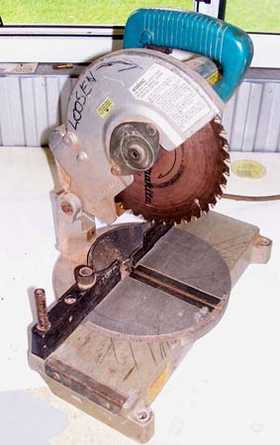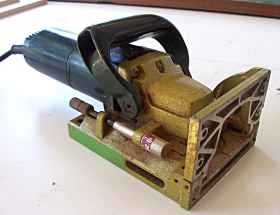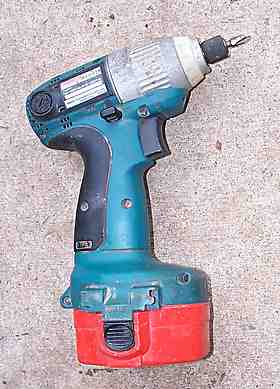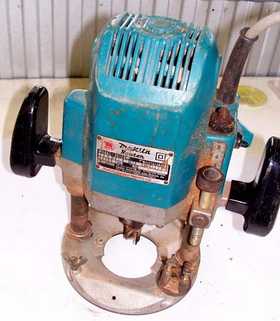 |
|||||||||||
Introduction to Power tools for home and building work.To jump straight to a particular power tool select from the menu on the right.
Don't get obsessed with power tools and accessories. For many small DIY jobs a hand tool will be OK. You would be surprised how much work you can do with a sharp hand saw or chisel. Just get what you need as the job comes up. Ask yourself "will it pay for itself soon?". They usually do, but don't buy it if you don't really need it! Hire is a good alternative. Hire shops have a wide range of tools and using a hire tool for a job, can sometimes help you to decide what to buy for yourself. If I lost every one that I own now and had to start again, the first three that I would replace would be:- I love my power tools. I can't imagine being without them. Yet They are noisy, they cover me with dust, I have to pay for consumables, blades, sharpening, and all that. I still love them, because they make my work easier, faster and hopefully, profitable. You can make your DIY and home improvement jobs possible and easier with them. Get a feel for when the tool is working well. Get to recognise when it's spinning along at the right revs, with plenty of cooling air getting to the motor and it's cutting nicely. Don't abuse it and you'll get lots of work out of it. If it jams or stalls find out why. Pick up on when you are pushing too hard, if it's revving to slow and the motor's getting hot. If the motor gets hot to touch, let it cool down. Keep the air vents clean and open. It is easy for the vent holes to get clogged in things like timber saws and buzzers. As far as practical keep the cutting parts sharp, you just overheat and over stress the tool by pushing on with dull cutters etc. In the photo of the miter saw, note the arrow on the blade guard. This shows the direction of the rotation of the blade, so that you get the blade teeth pointing the right way. It also shows the direction to turn the spanner to undo the nut that holds the blade This is correct for all power tools. The fixing nut comes undone in the direction of the rotation of the tool. The reason is simple, the action of the turning shaft always tightens the nut. Some machine have and arrow stamped on the case, some are right hand thread, some are left hand thread. It can get confusing with something like an old grinder that you have not used for months. Choosing ToolsFirst off, you may not know if DIY is going to be your thing. It is pointless laying out a lot of money for long lasting quality tools, if at the end of it you don't use them. Garage sales are a good place to find tools at a good price. Hardware stores carry a full range from very cheap to very expensive. Start with your first DIY drill and maybe a saw as cheapies, see if you like it. They will still get used even when you start to get bigger and better ones. Once you have done a few jobs and you are more confident, start getting better quality tools. I am a bit wary of these multi-purpose tools. Things with a lot of accessories that do this and that. Stick to standard items. I usually go for medium to just under top of the range power tools. I guess you'd say the tradesman range. Really top price stuff usually caters for specialist applications that you probably won't need. An example, if you had a lot of dry concrete type cutting to do, (like a block layer or ceramic tiler) you could splash extra cash and buy a specially dust sealed grinder. Most guys don't bother, they just get as much as they can out of standard tools. A quick point here, you can get good used power tools, but stay clear of ones that have a lot of cement dust around the intake vents etc. Ceramic tilers and the like wear out grinders on a regular basis, it's just a cost on their jobs. Don't get stuck with one of their throw outs. You will see heaps of tools illustrating these pages that look like crap, but they all do the same job that they did when they were brand new. The reason they look like crap is because they have had a long hard life, (tell me about it :-) The reason they still do the job is because they were well made by reputable companies. Another aspect of getting a long life out of any tool, be it the cheapest DIY quality or very expensive, is getting a feel for the machine. I have said this before, but it it cannot be overstated. Let the power tool do the work. When the tool blade starts to get dull, compensate for this by slowing down, giving it more time to do the same work. When it is too dull, sharpen it. Never force a power tool to the extent that it gets hotter than normal, or that you can smell burning, either from the motor or the material being cut. I have mostly one brand of electric power tool, Makita. I don't say it's the best, there are a lot of good tools out there, but.... In our town, there is, and has been for the last 30 years only one manufacturer's agent who carries stock of parts and accessories, and has on board a top repair man. Makita. The Hitachi grinder that I was using for months on my last job, is tough, powerful and has a better guard adjustment than my Makita ones. I am not biased towards Makita tools so much as the Makita after sales service WHERE I LIVE. Check out your own situation.
I broke the habit of a lifetime a few years ago when I was looking for another 100mm angle grinder. I have a few, one with a cutting disc in it, one with a grinding disc, etc., but I needed another so I picked out a cheapy, a Chinese import. At the trade counter the guy says to me "yer intendin doin much work wi that Bill? ". Always ready with a smart reply I said "I don't think I've gotta lotta work left in me Frank ". He smiled and shook his head slowly. I realised then that he'd been trying to warn me off that particular tool. He'd probably had returns and bad feedback about them. I turned around and put it back on the shelf and picked up a cheapish Makita.Thanks Frank. More about the service issue.
To sum up.
Not found it yet? Try this FAST SITE SEARCH or the whole web |
Hire Equipment  Furniture Fittings - Architectural Hardware - Electronic Locking Systems - Technical Hardware BuilderBill sponsorship Power tool related pages
There is an old saying "A poor tradesman blames his tools" and it is definitely true in respect of a person who is qualified. by the time a person gets qualifications, they should know a good tool from a bad one, and should not be using crap tools anymore. With beginners it is a bit different, it is a slow process of getting a feel for a particular tool. Don't be too quick to condemn it and buy something better. Don't forget that the job, the end result is what matters. Not the hype in the tool stores with all their absolutly must have gadgets that will solve all your problems. "When I were a Lad"Old Walt who was a 75 years old joiner when I was an apprentice used to say. "Give us the tools and we'll do the job". Another of his favourites was- "the be all and end all of good work, is sharp tools" Only the tools have changed. |
||||||||||
|
|
|||||||||||
|
Please Note! The information on this site is offered as a guide only! When we are talking about areas where building regulations or safety regulations could exist,the information here could be wrong for your area. It could be out of date! Regulations breed faster than rabbits! You must check your own local conditions. Copyright © Bill Bradley 2007-2012. All rights reserved. |
|||||||||||



